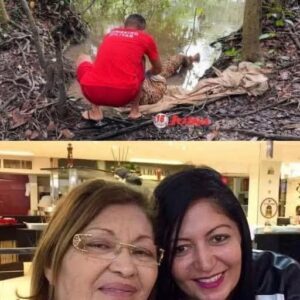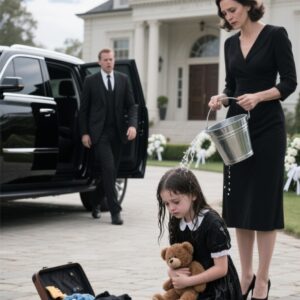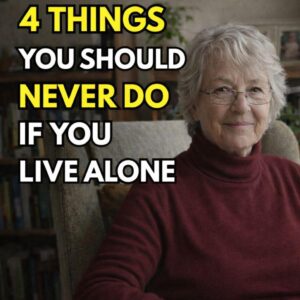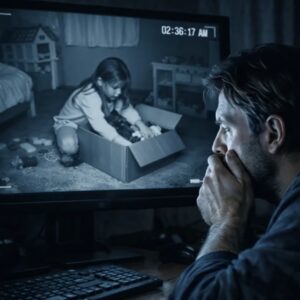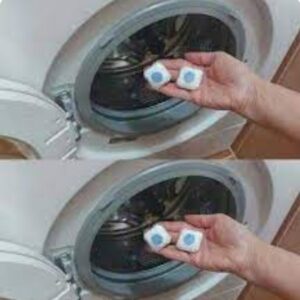Some places hold more than memories.
They hold souls.
The lake house my mother left me wasn’t just wood and glass—it was her final love letter to the world. It was where she painted, sang to herself while cooking, and sat by the water watching the sun melt into the horizon. Every corner of that home carried her warmth.
After she passed away, I inherited the house. I was twenty-one—too young to lose a mother, too old to pretend the world was still fair. But that house was what anchored me. It smelled faintly of lavender and cedar, and every summer breeze that swept through the curtains felt like her whisper.
When the lawyer handed me the deed, I cried harder than I did at the funeral. It wasn’t just an inheritance. It was a responsibility—a promise to protect what she loved most.
I made that clear to my father and his new wife, Carla.
The Beginning of the Divide
Carla came into our lives barely eight months after Mom’s funeral. She met my dad at a charity auction, and within a year, they were married.
I tried to accept it, but something about her presence made my skin crawl. She was polished, opinionated, always needing to be the loudest person in the room. She called my mother’s taste “outdated bohemian nonsense” and once referred to her as “the woman who painted her grief onto furniture.”
I should have walked away from her that day, but I bit my tongue—for my dad’s sake. He seemed happy for the first time in years, or maybe just distracted enough to forget the emptiness in our home.
Still, Carla and I were never close. She never tried to be a mother figure; she was more like an intruder who wanted to rearrange everything that wasn’t hers.
After they married, she began redecorating the family house—ripping down Mom’s wallpaper, boxing up her old pottery, and replacing it with minimalist furniture that looked like it belonged in a hotel lobby.
When I asked where she’d stored Mom’s things, she said, “Oh, those old trinkets? The Salvation Army probably has them by now.”
That was the day I drew a boundary.
The lake house was off-limits.
The Sanctuary
The lake house sat two hours north of the city, surrounded by tall pines and glassy water that caught the sunrise like liquid gold.
It had always been a place of peace. Mom and I spent summers there painting together—her with her oils and brushes, me with my sketchpad and clumsy hands. She used to hum while she worked, an old tune her grandmother had taught her. Sometimes she’d stop painting, dip her fingers into blue paint, and streak a smudge across my nose, laughing as I chased her around the porch.
After she passed, I couldn’t bring myself to change a thing.
Her paintbrushes still sat in the glass jar by the window. The linen curtains she’d sewn herself fluttered softly in the breeze. Even the chipped mug she always used for cocoa was still there, resting on the counter like she’d just stepped out for a walk.
Every year, on the anniversary of her death, I went there alone. I’d sit in her old window seat, drink coffee, and talk to her—about my job, my friends, my struggles. It was the only place I ever felt she was still near me.
And every year, I locked it carefully before leaving.
Until the fifth year—when everything changed.
The Violation
It was a crisp spring morning when I drove up the winding road toward the lake. The trees were just starting to bud, and I remember thinking how beautiful it all looked—how Mom would’ve painted it in shades of gold and green.
But as I turned into the gravel driveway, I stopped cold.
Fifteen feet ahead, four cars were parked haphazardly across the grass. Loud music spilled from the open windows. I could hear laughter—voices echoing from inside the house.
My heart dropped.
Through the window, I saw people dancing, holding drinks. And there—at the center of it all—was Carla.
My stepmother.
In my mother’s house.
She was wearing a wide-brimmed hat, wine glass in hand, twirling around in the living room like she owned the place.
And then I saw it.
My mother’s embroidered pillow—one she’d stitched by hand years ago—was on the floor. Someone’s boots rested on it.
I gripped the steering wheel so hard my knuckles went white.
Carla had stolen the keys.
The thought alone made me sick. I didn’t storm in right away—I was too stunned, too hurt. Instead, I sat in the car and tried to calm the trembling in my hands.
I knew I needed proof.
That’s when I remembered the small security cameras I’d installed six months earlier after a few nearby break-ins. I’d never thought I’d need them for something like this.
I quietly backed out of the driveway and drove away, my chest heavy with anger and disbelief.
The Evidence
That night, I connected to the camera system and watched.
What I saw made me sick.
The footage showed Carla arriving two days earlier. She unlocked the door with my key. I could see her smirking as she let herself in, muttering to someone on the phone.
Her voice came through clearly on the recording.
“God, this place is a time capsule. The hippie’s shrine to bad taste.”
She laughed, walking through the house, touching my mother’s artwork like it was something dirty.
Then she started redecorating.
She took down Mom’s paintings, stacked them carelessly by the wall, and replaced them with abstract prints she’d brought from home. Later, during her “party,” she and her friends mocked the decor—calling it “vintage tragedy chic.”
At one point, a guest accidentally knocked over one of Mom’s stained-glass pieces—a piece she’d made for me when I was a child. It shattered on the floor.
Carla didn’t even flinch.
She laughed and said, “Good riddance.”
That was enough.
The Confrontation
The next morning, I drove straight to my father’s house. Carla was sitting in the kitchen, sipping coffee like nothing had happened.
“Morning,” she said coolly. “You look upset.”
I laid my phone on the counter and hit play.
The video rolled. Her face drained of color.
When it ended, I didn’t shout. I didn’t cry. I just said, “You trespassed. You mocked her. And you broke the only thing she ever made for me.”
My father, who had walked in halfway through, stood frozen. His face turned pale as he watched his wife’s betrayal unfold on the screen.
“Carla,” he said quietly, “Tell me this isn’t true.”
But it was. And we all knew it.
Carla sputtered excuses—claimed she thought the house was “family property,” that she “just wanted to clean it up.” But the footage showed too much. The texts she’d sent her friends calling it “the dead woman’s hippie hut” sealed her fate.
I told her she had 24 hours to turn herself in—or I’d do it for her.
She didn’t believe me.
So I did.
The Consequences
The police took the case seriously. With the footage and messages I provided, Carla was charged with criminal trespassing, theft, and vandalism. She eventually pled guilty to avoid trial, but the damage was already done.
The court ordered her to pay restitution for the destroyed items and issued a restraining order preventing her from coming within 500 feet of the lake house.
The fallout was swift.
My father filed for divorce three months later. He told me he’d tried to see the good in her, but what she’d done was “unforgivable.”
I didn’t take any joy in his pain. But I did feel something close to relief.
Justice doesn’t always come quickly. But when it does, it feels like balance restored.
The Aftermath
Once the legal dust settled, I went back to the lake house for the first time in months.
I unlocked the door slowly, half afraid of what I’d find. But the moment I stepped inside, I felt her again—the stillness, the quiet, the peace that had always lived within those walls.
I spent the next week restoring everything Carla had touched. I rehung Mom’s paintings, repaired the broken glass piece as best I could, and placed her embroidered pillow back on the window seat.
Each act felt like healing.
Every stroke of paint, every nail, every gentle wipe of a surface carried intention—an unspoken promise that no one would ever violate this place again.
One evening, as the sun dipped low over the lake, I brewed a pot of cocoa—the same way Mom used to—and sat on the porch wrapped in one of her old quilts.
The house was quiet except for the creaking of the dock and the soft hum of crickets. I looked out at the water, gold and glassy, and whispered, “I love you, Mom. I’ll always protect this place for you.”
It wasn’t just words. It was a vow.
The Lesson
People often talk about karma like it’s some mystical force that punishes the bad and rewards the good. But I’ve learned that karma isn’t always loud. Sometimes it’s slow, methodical, and just.
Carla thought she could steal what wasn’t hers. What she didn’t realize was that my mother’s love didn’t die with her—it lived on in me, in the walls she built, in the art she left behind.
When Carla took those keys, she thought she was taking power. Instead, she unlocked her own downfall.
The lake house stands today exactly as my mother left it—a sanctuary of color and warmth, filled with light that spills through the stained glass I repaired piece by piece.
My father visits sometimes. We sit on the porch in silence, watching the water. He never talks about Carla anymore. He doesn’t have to.
Mom’s house, her legacy, survived.
And so did we.
Because some places are more than property.
They’re promises.
And I kept mine.
